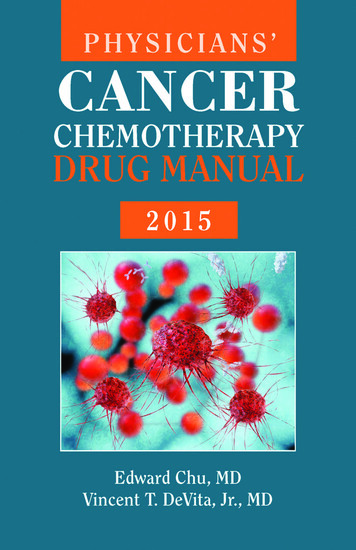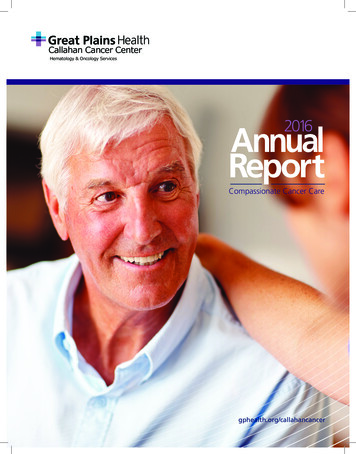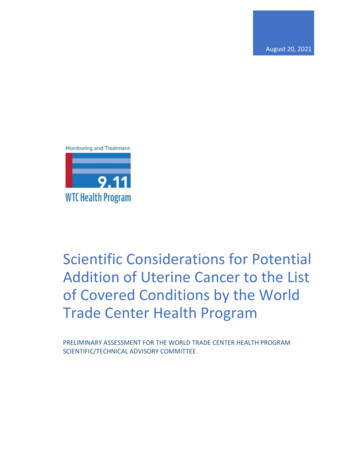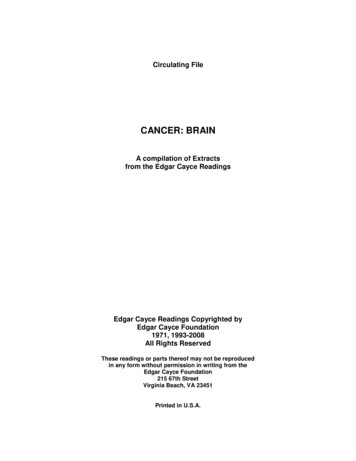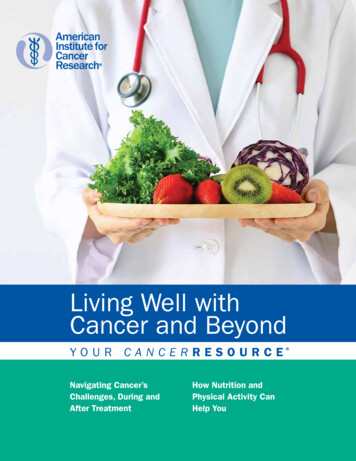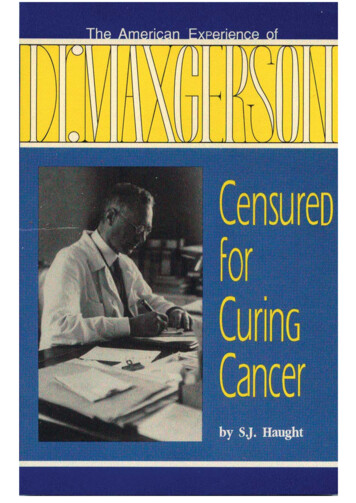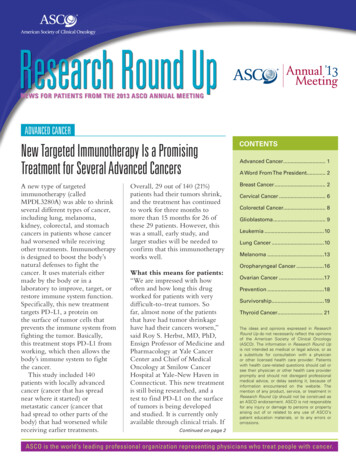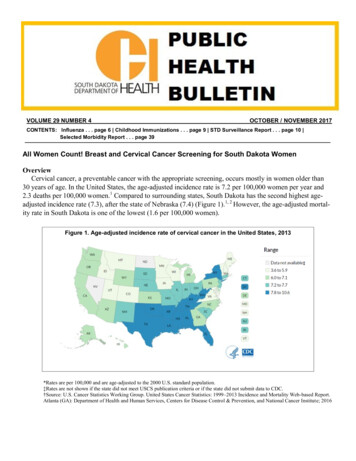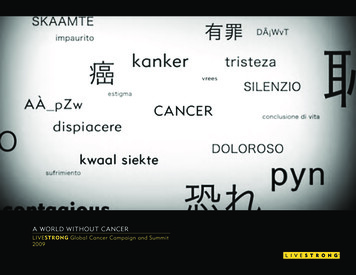
Transcription
A WORLD WITHOUT CANCERLIVESTRONG Global Cancer Campaign and Summit2009
LIVESTRONG GLOBAL CANCER CAMPAIGN AND SUMMITCancro. Kanker. Cancer. The word itself can stir up feelings of fear and imagesof loss in those who come in contact with the disease personally. In any language and in every corner of the globe, cancer is one of the most seriouslooming public health threats facing governments, economies, individuals andhealthcare systems. It differs from place to place, and affects people in differentways. But one thing is certain—the fight against cancer requires leadership andimmediate action.Why?Because by 2010, cancer isprojected to become the leadingcause of death worldwide—claiming more lives than AIDS,malaria and tuberculosis combined. The death toll is set torise dramatically in the comingdecades. These projections areboth shocking and tragicbecause cancer is one of themost preventable and curableof the major life-threateningdiseases facing the world today.Thirty percent of cancers arepreventable, and one-thirdof cancers are treatable ifdetected early.But statistics and numbersreveal only part of the story. Thefaces and experiences of cancersurvivors, their families, friendsand communities tell the rest.For more than 10 years,LIVESTRONG has partneredwith other nonprofit cancerorganizations and committed“Among the attendees from 65 countries were people who camewith their own special story of their cancer. It was sobering tomeet them and to hear how they were fighting back in many casesthrough setting up their own organizations, often with meagerresources, to advocate on behalf of and to reach out to othersaffected by cancer. These people are silent heroes. I cannot stopthinking about them, and reflecting on how the Global Summitgave them a voice.”—John McCormackChief Executive Officer,Irish Cancer Societyadvocates to make cancer anational priority in the UnitedStates. Recent research hasshown that there are now 28million people throughout theworld who experience delayeddiagnosis and suffer in isolationfrom cancer because of lackof awareness and widespreadmisconceptions that result in aterrible social stigma related tothis disease.In an urgent effort to addressthis growing burden of canceraround the world, we committedto take action by launching theLIVESTRONG Global CancerCampaign at the 2008 ClintonGlobal Initiative AnnualMeeting. This commitmentspurred activities in countriesfrom Australia to Mexico to Italythroughout the year—bringing the message of hope andcollective action against cancerto each location the campaigntraveled.Our commitment resulted in thelandmark 2009 LIVESTRONGGlobal Cancer Summit, whichbrought together more than 500world leaders, corporations, nongovernmental organizations andadvocates who are all workingto reduce the burden of cancerin their own countries andcommunities.
LIVESTRONG GLOBAL CANCER SUMMITThe global cancer burden requires a global, collaborative response. During August 24–26, 2009, an unprecedented gathering of 500 delegatesrepresenting more than 65 countries occurred in Dublin, Ireland, at the LIVESTRONG Global Cancer Summit.This Summit provided a platform designed to advance the global fight against cancer. Delegates were selected for their significant commitmentsto the cause. Discussions addressed every aspect of the cancer experience and the changes necessary to fight cancer around the world. Peoplerepresenting the smallest NGOs from Africa stood shoulder-to-shoulder with world leaders, underscoring the importance of unity and collaboration. Just as cancer respects no borders or socioeconomic divisions, the response will come from leaders and individuals around the world.The Summit included presentations and roundtable discussions and highlighted the leadership, reach and innovation of non-governmentalorganizations, corporations and individuals in their commitments and actions in the fight against cancer. Delegates offered thoughts andquestions for panels, and their roundtable discussions were analyzed to define overarching Summit themes.Day 1Days 2 and 3 World leader commitment presentations Presentation of World Cancer Declaration 2008 signatures Plenary sessions on the worldwide cancer burden and globalcall to action Conversation on corporate social responsibility Briefings on the economic impact of cancer and stigmaRoundtable and panel discussionsGrassroots training sessionsPersonal action commitmentsAs a result of attendingthe LIVESTRONGGlobal CancerSummit, the followingpercentage of our surveyrespondents agreed96% are better able toshare their story.97% developed a deeperlevel of understanding aboutthe issues related to cancer.97% learned something ormet someone that will helpthem accomplish their goals.99% are more aware thatthey are an important part ofthe global fight against cancer.A Path Forward through UnityDuring the Summit, this LIVESTRONG statement of unity was put forth as a roadmap to guide our actions as we strive to reverse the course ofthe cancer epidemic and reduce the burden of the disease:99% made connectionsWe face a looming public health crisis as cancer becomes the leading cause of death worldwide. Cancer strikes without respect for politicalborders, age or socioeconomic status and manifests differently from place to place. It is a global problem that requires collective action via aglobal movement to change the course of the disease. A failure to act is indefensible—the human and economic costs are too high. And patientsand survivors around the world cannot wait for action. From today forward, advocates, governments, the development community and the privatesector must collaborate to realize new and effective policy, programmatic and investment solutions.100% feel empowered withnew ways of engaging others inthe global fight against cancer.“We were all aware of the needto make cancer a global priority but, during the Summit, weactually started to believe thatthis is possible.”—Snezana Bosnjak, Serbiathey will maintain with otherNGOs and advocates.
The following four priority actions were reinforced and celebrated throughout the Summit in the words ofspeakers, in roundtable discussions and in stories told by participants and the media. LIVESTRONG supportsthese priority actions as a roadmap to making cancer a global priority:National Cancer Plan DevelopmentEvery government should develop and adopt a national cancer plan—a coordinated strategy, goals and timeline for addressing the burden of thedisease within their borders. Regional and supranational organizations should seek to coordinate efforts across borders.National cancer plans will specifically identify the needs of each country and forge the appropriate solutions and strategies. The global cancercommunity must provide support and work together to ensure plans are created and executed. Three key components must be integrated intoevery national cancer plan to ensure their effective implementation:1. Identification of the role ofeach stakeholder group withstrategies, goals, actionsteps and a timeline toensure the plans moveforward and that progressis accurately assessed.2. Distribution of national cancerplans should include an educational component, such aswell-known spokespeople andadvocates with personalstories, to inform peoplethroughout the country aboutthe plan and to advocate forits success.3. As lessons are learned fromaround the world about effective interventions, strategiesand policies, ideas shouldbe shared and brought to theforefront so that other countries might benefit as well.National Cancer Plan Development CommitmentsThe following commitments are specific examples of actions pledged by governments and advocates toward this goal: India has increased itsnational anti-cancerinvestment tenfold and hascommitted to increasingawareness, prevention andcontrol of cancer throughthe National Cancer ControlProgram for the benefit of theentire 1.1 billion population—especially the impoverishedsuffering from cancer. The African Organizationfor Research and Training inCancer (AORTIC) has pledgedto draft a National CancerControl Program for Africaand have it implemented bythe Health Ministries. La Ligue nationale contre lecancer in partnership withthe International UnionAgainst Cancer (UICC) hascommitted to creating aninternational French-speakingnetwork dedicated to the fightagainst cancer. This threeyear, multinational projectwill include more than 20countries in Africa andthe Middle East, the AfroMediterranean cancer networkof survivors, their familiesand friends, healthcare professionals, hospitals and clinics.Efforts will be tailored toindividual country needsand focus on exchange ofbest practices and sharedexperiences to improvecancer control efforts andsurvivor support in Frenchspeaking countries.“Governments must seek whatI call collaborative efforts tobe able to maximize its ownefforts and have higher effectsfrom its own resources.”—His ExcellencyOlusegun ObasanjoFormer President, Nigeria
Investment and Funding for Cancer Research, Prevention and TreatmentFunding for cancer research, prevention and treatment should be prioritized as a public health investment that will yield significant future savings. Greater public and private investment is needed to close the gap between current spending and the significant burden of cancer borne by countries around the world.An Economist Intelligence Unit report, Breakaway: The global burden of cancer—challenges and opportunities, was commissioned by LIVESTRONG to determine the economic impactof cancer and the gap between current funding levels and what is needed to effectively fight cancer—the first time that the global burden of cancer has been converted to economicterms and the global gap in cancer spending quantified.The Breakaway report estimates the total economic burden of new cancer cases to be 305 billion in 2009. It identifies a 217 billion treatment expenditure gap for 2009, with low- andlower-middle income countries comprising 65 percent of that gap. In 2009, 12.9 million new cancer cases are anticipated. In 2020, it is estimated that there will be 16.8 million newcancer cases, with this burden felt most heavily in the developing world.The Breakaway report issues an imperative call to action for global communities to act now and make new investments in cancer control, even in the face of the current economicdownturn, in order to avoid overwhelming costs in both lives and money in the future. The visibility for cancer initiatives must be raised in order to address the great disparities that existbetween the burden and the national and global expenditures for cancer.The good news is that by applying what we know about prevention, early detection, screening andtreatment, millions of lives around the world can be saved.Report available at LIVESTRONG.org/Summit.Investment and Funding for Cancer Research, Prevention and Treatment CommitmentsThe following commitments are specific examples of actions pledged by governments and advocatestowards this goal: The Middle East CancerConsortium (MECC) plans toimprove the current cancerregistry project in the MiddleEast to obtain more accuratedata concerning the incidencerate of new cancer cases inEgypt, Jordan, PalestinianAuthority, Israel, Cyprus andTurkey. Further, MECC will establish palliative care servicesin the region to provide physicaland psychological support programs for cancer patients andtheir families. The Africa Tobacco ControlRegional Initiative (ATCRI) isan initiative of Cancer ResearchU.K. and the American CancerSociety, who are committed toimproving access, disseminationand exchange of informationby building institutional andhuman capacity for tobaccocontrol across the Africancontinent. ATCRI also willbuild a coalition among majorplayers in tobacco controlin Sub-Saharan Africa andpromote research in keyareas of tobacco control. The Ministry of Health ofthe Republic of Chile enteredinto an alliance with the U.S.National Cancer Institute toaccelerate progress in the fightagainst cancer in Hispanicpopulations in the U.S. andacross Latin America. Theiragreement results in theformation of the UnitedStates-Latin America CancerResearch Network that willfocus on basic and clinicalcancer research, bioinformatics, data systems and transferof technology.
Investments in the Public Health Infrastructure and EducationInvestments in essential public health infrastructure and educationcan have an impact on noncommunicable and communicable diseases. We encourage integrating noncommunicable disease targetsin the Millennium Development Goals to underscore the urgent needfor governments, the international development community andphilanthropic organizations to commit resources to meet the healthneeds of the world’s population. As evidenced by the Breakawayeconomic report presented at the Summit, noncommunicablediseases such as cancer can have a substantial impact on development in emerging economies.The MDGs are established and accepted goals, several of whichaddress the health of countries. However, cancer and other noncommunicable diseases are not currently included in these goals.As a result, organizations and governments face an uphill battlein receiving the necessary visibility, support and funding to addresscancer in their countries.The eight Millennium Development Goals (MDGs), designed toreverse the poverty, hunger and disease that affect billions by 2015,are drawn from the actions and targets contained in the MillenniumDeclaration adopted by 189 nations and signed by 147 heads of stateand governments during the UN Millennium Summit in September2000. The MDGs have been adopted by the international community as a framework for the development activities of more than 190countries in 10 regions.Investments in the Public Health Infrastructureand Education CommitmentsIn recognition of the importance of this issue, governments andadvocates alike are taking action to align with partners who arealready working in the area of communicable disease. They areadapting lessons learned from the following commitments (andothers) offered at the LIVESTRONG Global Cancer Summit:“The rise of cancer creates anenormous burden on healthsystems around the world.But this is not just a healthchallenge; it undermines economic growth and acts as achronic poverty trap for thepoorest countries. Bilateraland multilateral donors are notresponding to requests fromdeveloping countries to supportthem in building sustainableinstitutional capacities toaddress non-communicabledisease because these issuesare beyond those targeted bythe Millennium DevelopmentGoals. We need to take a closelook at addressing that gap.”—Dr. Ala AlwanAssistant Director-General,Noncommunicable Diseaseand Mental Health,World Health OrganizationBy encouraging integration of noncommunicable disease targets inthe Millennium Development Goals, we can help ensure investmentsin the essential public health infrastructure can and do occur. Partners in Health (PIH) is a well-known, non-governmentalorganization with a long history of success and more than twodecades of experience delivering high-quality care, includingtreatment for complex chronic diseases in resource-poor settings.PIH has committed to build on its established networks of healthcenters, mobile clinics and community health workers to providevaccination against HPV (human papillomavirus) to 8,000 girlsaged 9–14 in Haiti and Lesotho. A Global Coalition to Stop Cervical Cancer has committed toa three-year project to expedite the global availability, affordability and effective use of new and improved prevention and earlydetection tools. This will be done through assessment, advocacy,information sharing, collaboration and resource mobilization. Thecoalition is committed to promoting the effective introduction anduse of innovative new tools such as HPV vaccines, visual screeningmethods and new, rapid HPV DNA tests in developing countries.“I believe in health care asa human right. The fight forhealth care is a human right.The goal of preventing humansuffering must be linked to thetask of bringing others—manyothers—into a movement forbasic rights.”—Paul Farmer, MD, PhDCo-founder, Partners inHealth and Deputy UNSpecial Envoy for Haiti
Reducing Stigma for Cancer Patients and SurvivorsCancer patients and survivors deserve to live—and die—with respect and dignity, not discrimination, becauseof their disease. Efforts to reduce stigma should be supported through the implementation of educationalprograms and awareness-building efforts, creation of support systems for patients and families and a healthsystem that supports compassionate end-of-life care.Throughout the Summit, the need for decreasing stigma through education and awareness was discussed.The following three key points arose:1. We know that 30 percent ofcancers are preventable andthat by applying what weknow we could literally stopthe disease before it starts. Bychanging the way studentsthink about cancer, we havethe opportunity to reduce thecancer burden over time starting with our youngest citizens.2. We must ensure that healthcare providers are educatedand supported to give empathetic, quality care with anawareness of the needs ofpeople with cancer throughoutthe cancer experience.3. We must use innovativemethods to reach thosewho are most in need.Successful outreach andeducation interventionsshould encourage partnerships and collaborationwith advocates and usemedia, social networkingand other technology.Reducing Stigma for Cancer Patients and Survivors CommitmentsIn recognition of the importance of this issue, governments and advocates alike are taking action: Molebatsi Pooe-Shongwe,the founder of BreastSensin South Africa, will implement a national campaigncalled Amabele wam (whichtranslates to “MY breasts MYdecision”) to empower womento assert their right as soledecision-makers over theirbodies, promote breast healthawareness and build genderalliances in the fight againstthe stigma of cancer.“What they need is anassurance, ‘we are with you.’I honestly think rather thanadvice, there should be thisconcerted effort [toward]offering information,empowering people andensuring support.”—Dr. M.R. RajagopalPallium India Andrew Young, CEO ofCanTeen Australia in Sydney,has committed to improvingservices, support and care foradolescents and young adultswith cancer because survivalfor this group is laggingdramatically behind other agegroups. CanTeen will establish a network of specializedAYA cancer services aroundAustralia, write and adopt aninternational charter of rightsfor adolescents and youngadults with cancer and raise 15 million over five years tomatch the commitment madeby the Australian government.Among other issues, the international charter of rights callsfor the elimination of all formsof discrimination, during andbeyond treatment, in education, vocation and insurance,or in the community.“LIVESTRONG campaigned to obtain more than 100,000 signatures in support of theWorld Cancer Declaration,” said Doug Ulman, President and CEO of LIVESTRONG.“From cancer survivors and activists to family members and physicians—thesignatories represent our global commitment to galvanize the UICC’s truly grassrootsmovement. The World Cancer Declaration is an unprecedented plan of action that willforever shape the future policies in the battle against cancer.”WORLD CANCER DECLARATIONDuring the 2009 LIVESTRONG Global Cancer Summit in Dublin, Ireland, LIVESTRONGpresented more than 100,000 signatures on the World Cancer Declaration to Dr. DavidHill, President of the International Union Against Cancer (UICC). Every Summit commitment was directly related to this important declaration.
Final ThoughtsInvestments in public health infrastructure and education do not have to becostly or burdensome—some require fiscal resources while other investmentsrequire only political will to change policies. These investments will benefit thefight against communicable and noncommunicable diseases alike. Many interventions are known to successfully reach even those populations that are themost challenging to access. Global cooperation and adoption of proven methodswill have a positive impact on the incidence and treatment of cancer—and ofother diseases as well.As LIVESTRONG has learned over time from our efforts in the United States, to truly make cancer a prioritywe must engage people and communities to drive social change. We must engage people at all levels ofsociety, even those not currently committed to the fight against cancer, to ensure this disease is preventedand treated around the world. Through the outpouring of online communication since the Summit we havealready seen many people taking action in their communities and in connection with new partners.Over the next year, LIVESTRONG will work with our partners to measure the success of the Summit and thework of the LIVESTRONG Global Cancer Campaign and to determine the impact the Summit had on thefight against cancer with the goal of sharing our results at the World Cancer Congress 2010. In addition,LIVESTRONG will continue to collaborate with multi-lateral organizations and world leaders to realizegreater global priority for cancer control and health infrastructure change, continuing our relationshipswith the UN, WHO, World Bank, G8 leaders and other decision-makers who have the capability to raisethe profile of the disease and marshal new resources.99% of LIVESTRONGGlobal Cancer Summit surveyrespondents agreed theSummit provided a one-ofa-kind platform which willsignificantly advance theglobal fight against cancer.97% of respondents agreedthey felt like an active partof the LIVESTRONGmovement making cancera global priority.Through collaboration across all levels, governments, corporations,advocates and the medical community can make cancer a globalpriority and realize these changes. LIVESTRONG will continueits commitment to this process and continue to work to unite andempower those committed to ending the suffering caused by cancer.“From today forward advocates, governments, the developmentcommunity and the private sector must collaborate to realize newand effective policy, programmatic and investment solutions. Thisis a very difficult challenge, but this room can do it. Your friendsand family, and your communities, countries and continents cando it. We believe in that—you believe in that—we just have to goand do it!”—Lance ArmstrongChairman and Founder, LIVESTRONG“I think what will make this Summit a success is that people willstart working together in ways they haven’t heretofore. Once theydo that, we know from experience that they get results.”—Dr. John SeffrinChief Executive Officer, American Cancer Society“The field is currently very fractured, with few groups workingtogether, and you bringing these groups together gave a verypowerful message. Speaking with many of the delegates, they wereclearly energized with a new hope of moving this cause forward.”— Lawrence N. Shulman, MD“LIVESTRONG has the ability to organize, reach out andnetwork with organizations, support groups and lobby politically.LIVESTRONG can take on the leadership role and under theirumbrella guide organizations, governments and bringabout changes all over the world.”—Summit Delegate, India“You have given me the tools to proceed forward not only in mycommunity, state and country but the world. To stimulate therealization that it is possible is a credit to LIVESTRONG and all itsemployees and volunteers.”—Dawn DurbinAmerican Cancer Society Legislative Ambassadorand Ovarian Cancer Survivor
LIVESTRONG GLOBAL CANCER CAMPAIGN TIMELINEFEBRUARY LanceArmstrong competesin the Amgen Tour ofCalifornia, his secondrace in his return toprofessional cycling,and continues hisefforts to buildawareness aboutthe worldwide threatof cancer.FALL 2008FEBRUARY U.S. President Barack Obama signs a law providing 10 billion for research at the National Institutes of Health,including 1.26 billion for cancer research, and urges Congressto seek “a cure for cancer in our time” by doubling the budgetfor cancer research.FEBRUARY Official announcement that theLIVESTRONG Global Cancer Summit event inDublin, Ireland, will be held in August.WINTER 2009SEPTEMBER Lance Armstrongunveils the LIVESTRONGGlobal Cancer AwarenessCampaign—an initiative toaddress the burden of cancerworldwide—before world leaders, policy makers and nonprofitorganizations gathered at theopening session of the ClintonGlobal Initiative in New York.“I hope all of us follow Lance in thefight against cancer [around] theworld. And I am sure that we cando it for people to have access toa better life and to overcome thisillness that until recently wasconsidered deadly, fatal, unbeatable.We can do it.”—Felipe Calderón HinojosaPresident of MexicoAPRIL Hashemite Kingdom of Jordancommits to a five-year, 300 millioncancer control initiative to build acutting-edge cancer treatment andresearch facility, develop a nationalcancer control plan and create anOffice of Advocacy and Survivorship.SPRING 2009JANUARY LIVESTRONGlaunches the Campaign at theTour Down Under in Australia.Australian Prime MinisterKevin Rudd announces hisgovernment will invest 3.8million to fund new researchand clinical trial initiatives toreduce the impact of cancer onall Australians.“With these investments, Jordan hopes othercountries in the region will join us in our efforts toimprove cancer care, research and development inthe Middle East. We are proud to be associated withthe LIVESTRONG Global Cancer Campaign and arehopeful about the progress we can make together.”—His Majesty King Abdullah IIHashemite Kingdom of JordanFEBRUARY The LIVESTRONGGlobal Cancer Campaigncontinues in Mexico, whereMexican President FelipeCalderón Hinojosa pledgeshis support.MARCH In collaborationwith the National CancerInstitute of Mexico,LIVESTRONG bringstogether Mexico’s leading voices on cancerand public health fora roundtable event todiscuss the burden ofcancer in their country.MARCH LIVESTRONG announcesthat Mary Robinson, the first femalePresident of Ireland and former UnitedNations High Commissioner forHuman Rights, will serve as HonoraryChairperson of the LIVESTRONGGlobal Cancer Summit.“It is up to all of us—governments, non-governmentalorganizations, cancer survivors, all concernedindividuals—to see that detection and treatmentare offered to as much of the world’s population aspossible. Through the LIVESTRONG Global CancerSummit we will make great strides towards makingthis a reality.”—Mary RobinsonFirst female President of Ireland,Former United Nations HighCommissioner for Human Rights,Honorary Chairperson of theLIVESTRONG Global Cancer Summit
MAY Treasurer Wayne Swan announcesas part of the 2009–2010 budget that theAustralian Government will invest a record 2 billion (over five years) to build a “worldclass cancer care system.”JUNE By the June 15 submission deadline,LIVESTRONG receives more than 250commitments from around the world aspart of the application process for theLIVESTRONG Global Cancer Summit.JULY Following thestart of the Tour deFrance, more than15,000 inspirationalmessages are submitted online or by text toNike’s custom-madeChalkbot, which writesthose messages inyellow chalk alongthe roads of the Tour.AUGUST LIVESTRONG releases the Economist IntelligenceUnit report, Breakaway: The global burden of cancer—challenges and opportunities, the first global assessmentof the funding dedicated for cancer control efforts and theimpact of cancer on the global economy.FALL The EuropeanCommission launches the“European Partnership onCancer,” a pan-Europeancommitment to combating cancer across all 27member countries.SUMMER 2009MAY Lance Armstrongparticipates in his premiere Giro d’Italia (May9–31), which celebratedits 100th anniversarythe same year. Lancemeets with the Ministerof Foreign Affairs, FrancoFrattini, who pledgeshis support for theLIVESTRONG GlobalCancer Campaign.JUNE LIVESTRONG and theAmerican Cancer Society forma first-of-its-kind partnershipto empower and supportsurvivors all over the worldand aggressively address theglobal cancer burden. TheSociety becomes an international collaborating partnerfor the LIVESTRONG GlobalCancer Summit.FALL 2009JULY LIVESTRONGAction.org launchesto grow the LIVESTRONG global movement and to collect signatures for theWorld Cancer Declaration. The goal isto build these submissions into theworld’s largest dedication book—aliving document that demonstratesthe personal impact of cancer.AUGUST More than 500world leaders, corporations,non-governmental organizations and advocates attendthe premiere LIVESTRONGGlobal Cancer Summit inDublin, Ireland.FALL LIVESTRONGreports the success of itsLIVESTRONG Global CancerCampaign at the ClintonGlobal Initiative.
the cancer epidemic and reduce the burden of the disease: We face a looming public health crisis as cancer becomes the leading cause of death worldwide. Cancer strikes without respect for political borders, age or socioeconomic status and manifests differently from place to place. It
